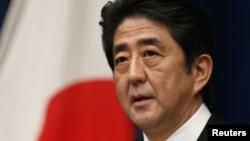Japanese Prime Minister Shinzo Abe's first trip abroad since his election will be to Southeast Asia, despite his desire to make the United States his first destination.
Abe will visit Thailand, Vietnam and Indonesia later this month, according to reports in the Japanese media.
According to Japanese newspaper Asahi Shimbun, he had to put off a U.S. visit because of “scheduling difficulties” with U.S. President Barack Obama.
"While I want to go to the United States as soon as possible and hold a summit to strengthen the Japan-U.S. alliance, I've broadened the scope of my schedule, partly because of the circumstances [on the U.S. side]," Abe told reporters in Tokyo Tuesday.
A U.S. visit could come in February, according to reports.
“What’s really important here is that, in contrast to his previous administration, he’s decided not to visit China,” said Mireya Solis, a senior fellow at the Brookings Institute and associate professor at American University focusing on Japan studies.
According to Solis, Japan's priority is reaching out to allies and supporters. “The preference is a robust relation with the U.S. That’s a priority, but Southeast Asia is going to be a very important partner given the relationship with China is so rocky,” she said.
During Abe’s first administration, which lasted from 2006-2007, his first trip outside Japan was to China.
Japan’s foreign minister is also embarking on a separate tour of Southeast Asia.
The Ministry of Foreign Affairs website said Foreign Minister Fumio Kushida is set to visit the Philippines, Singapore, Brunei and Australia from January 9 through the 14th.
The Kyodo news agency reported Kushida is set to travel to the U.S. later this month to visit Secretary of State Hillary Clinton.
Abe will visit Thailand, Vietnam and Indonesia later this month, according to reports in the Japanese media.
According to Japanese newspaper Asahi Shimbun, he had to put off a U.S. visit because of “scheduling difficulties” with U.S. President Barack Obama.
"While I want to go to the United States as soon as possible and hold a summit to strengthen the Japan-U.S. alliance, I've broadened the scope of my schedule, partly because of the circumstances [on the U.S. side]," Abe told reporters in Tokyo Tuesday.
A U.S. visit could come in February, according to reports.
“What’s really important here is that, in contrast to his previous administration, he’s decided not to visit China,” said Mireya Solis, a senior fellow at the Brookings Institute and associate professor at American University focusing on Japan studies.
According to Solis, Japan's priority is reaching out to allies and supporters. “The preference is a robust relation with the U.S. That’s a priority, but Southeast Asia is going to be a very important partner given the relationship with China is so rocky,” she said.
During Abe’s first administration, which lasted from 2006-2007, his first trip outside Japan was to China.
Japan’s foreign minister is also embarking on a separate tour of Southeast Asia.
The Ministry of Foreign Affairs website said Foreign Minister Fumio Kushida is set to visit the Philippines, Singapore, Brunei and Australia from January 9 through the 14th.
The Kyodo news agency reported Kushida is set to travel to the U.S. later this month to visit Secretary of State Hillary Clinton.




